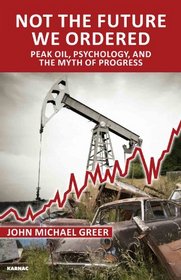Search -
Not the Future We Ordered: The Psychology of Peak Oil and the Myth of Eternal Progress
Not the Future We Ordered The Psychology of Peak Oil and the Myth of Eternal Progress
Author:
For well over half a century, since the first credible warnings of petroleum depletion were raised in the 1950s, contemporary industrial civilization has been caught in a remarkable paradox: a culture more focused on problem solving than any other has repeatedly failed to deal with, or even consider, the problem most likely to bring its own hist... more »
Author:
For well over half a century, since the first credible warnings of petroleum depletion were raised in the 1950s, contemporary industrial civilization has been caught in a remarkable paradox: a culture more focused on problem solving than any other has repeatedly failed to deal with, or even consider, the problem most likely to bring its own hist... more »
ISBN-13: 9781780490885
ISBN-10: 1780490887
Pages: 160
Rating: ?
ISBN-10: 1780490887
Pages: 160
Rating: ?
0 stars, based on 0 rating
Genres:
- Health, Fitness & Dieting >> Psychology & Counseling
- Science & Math >> Technology
- Nonfiction >> Social Sciences




